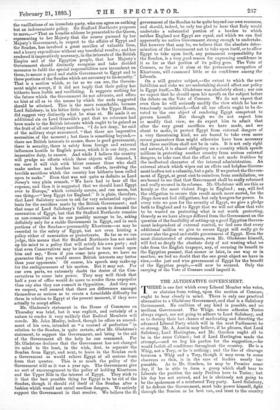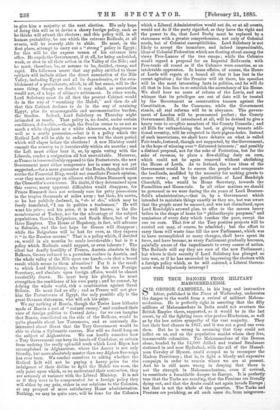THE ALTERNATIVE GOVERNMENT. THE ALTERNATIVE GOVERNMENT.
THERE is one fact which every Liberal Member who votes, or abstains from voting, upon the motion of Censure, ought to bear clearly in mind. There is only one practical alternative to a Gladstone Government, and that is a Salisbury Government. No coalition of any kind is possible, and no medium Government. The Whigs, whose adhesion Tories always expect, are not going to adhere to Lord Salisbury, and so to destroy their last chance of moderating and directing the advanced Liberal Party which will in the next Parliament be so strong. Mr. A. Austin may believe, if he pleases, that Lord Salisbury, Lord Hartington, and Mr. Goschen ought all to be in the same Cabinet ; but if Lord Hartington made the attempt,—and we beg his pardon for the suggestion,—he would forfeit all confidence throughout the country. He is a Whig, not a Tory, or he is nothing ; and the line of cleavage between a Whig and a Tory, though it may seem to some observers so thin, is in the case of leaders nearly impassable. As to Mr. Goschen, he may be Premier some day, if he is able to form a group which shall bear to Liberals the position the early Peelites bore to Tories ; but his day has not arrived, and he is obviously not going to be the spokesman of a reinforced Tory party. Lord Salisbury, if he defeats the Government, must take power himself, fight through the Session as he best can, and trust to the country to give him a majority at the next election. His only hope of doing this will be to devise a showy foreign policy, such as he thinks will attract the electors; and this policy will, in all human probability, be one which the extreme Radicals, at all events, will be scarcely able to abide. He must, in the first place, attempt to carry out a " strong " policy in Egypt ; for this will be the express reason of his entrance into office. He expels the Government, if at all, for being undecided, weak, or slow in all their action in the Valley of the Nile ; and he must, therefore, be, or assume to be, decided, strong, and rapid. His followers assert that any policy entitled to those epithets will include either the direct annexation of the Nile Valley, including Egypt and all its dependencies, or the establishment of a protectorate, which, in all but name, will be the same thing, though no doubt it may admit, as annexation would not, of a hope of ultimate retirement. In other words, Lord Salisbury must do all that the present Cabinet would do in the way of " smashing the Mandi," and then do all that this Cabinet declines to do in the way of retaining Egypt, plus its unmanageable and unremunerative burden, the Soudan. Indeed, Lord Salisbury on Thursday night intimated as much. That policy is, no doubt, under certain conditions, defensible,—though the Soudan seems to us not so much a white elephant as a white rhinoceros, a dangerous as well as a costly possession,but is it a policy which the Radical Left will be able to endure even for the short period which will elapse before the elections ? A new Ministry could commit the country to it irretrievably within six months ; and the Left must either bear it, or, by again voting with the Liberals, render a resignation all but unavoidable. Moreover, as France is irreconcileably opposed to this Protectorate, the new Government must either compensate her in some way not yet suggested,—for a mere guarantee of the-Bonds, though it would soothe the Financial Ring, would not conciliate French opinion, —or they must arrange an alliance with Prince Bismarck upon the Chancellor's own terms. No doubt, if they determined upon this course, many apparent difficulties would disappear, for Prince Bismarck does not seriously care for petty possessions in the tropics thousands of miles away ; but then, his motto, as he has publicly declared, is, "do ta des," which may be freely translated, "I am in politics a tradesman." He will want his price ; and his price, it is well known, is the dismemberment of Turkey, not for the advantage of the subject populations, Greeks, Bulgarians, and South Slays, but of the three Empires. The House of Hapsburg, in fact, will advance to Salonica, and the last hope for Greece will disappear ; while the Bulgarians will be lost for ever, as they express it " in the Russian morass." That is a policy which, if decided on, would in six months be made irretrievable : but is it a policy which Radicals could support, or even tolerate ? The silent but deadly hostility of France, Austria absolute in the Balkans, Greece reduced to a powerless enclave in Austria, and the whole valley of the Nile upon our hands,—is that a broad result which seems to them attractive ? For it is the result to which Lord Salisbury, who would be his own Foreign Secretary, and absolute upon foreign affairs, would be almost irresistibly drawn. He must keep his pledges, he must strengthen the confidence of his own party ; and he cannot, by defying the whole world, risk a combination against Great Britain. He must find an ally ; and as France will not give him the Protectorate of Egypt, the only possible ally is the great German statesman, who will ask his price.
We say nothing of Russia, though the Tories have hitherto made of Russia a sort of " natural enemy," and confined their view of foreign politics to Central Asia ; for we can imagine that Russia, conciliated on the side of the Balkans, would bo quite placable about her Turcomans, and so anxiously disinterested about Herat that the Tory Government would be able to claim a diplomatic success. Nor will we dwell long on the subject of Afghanistan. We can hardly conceive how a Tory Government can keep its hands off Candahar, or refrain from undoing the really splendid work which Lord Ripon has accomplished in Afghanistan, where the Ameer is not only friendly, but more absolutely master than any Afghan Sovereign has ever been. We confine ourselves to asking whether the Radical Left will not be paying a heavy price for the indulgence of their dislike to fight the Mandi too soon, the only point upon which, as we understand their contention, they are seriously at variance with the Liberal Ministry. It is not as if they were to be compensated for a foreign policy they will abhor by any gain, either in our relations to the Colonies, or any prospect of more satisfactory Home administration. Nothing, we may be quite sure, will be done for the Colonies
which a Liberal Administration would not do, or at all events, would not do if the party signified, as they have the right and the power to do, that Lord Derby must be replaced by a statesman with a greater comprehension, not only of Colonial needs, but of Colonial susceptibilities. Lord Salisbury is not likely to accept the immature, and indeed impracticable, ideas of Colonial Federation which are floating about among the viewy Free-Lances of the two camps ; while the Colonies would regard a proposal for an Imperial Zollverein, with Free-trade all round as if the Colonies were counties, as an intolerable oppression. In home affairs, of course, the House of Lords will regain at a bound all that it has lost in the recent agitation ; for the Premier will sit there, his speeches will be the most interesting facts in politics, and he will do all that in him lies to re-establish the ascendancy of his House. We shall hear no more of reform of the Lords, and any whisper that its privileges are out of date will be treated by the Government as constructive treason against the Constitution. In the Commons, while the Government stands, all real reforms will be in abeyance. The government of London will be pronounced perfect ; the County Government Bill, if introduced at all, will be devised to give a heavy vote to ex-officio members of the County Councils ; and all Bills for enfranchising the land, or giving tenants additional security, will be relegated to their pigeon-holes. Instead of such innovations, we shall have debates on what is called Pair-trade, fostered, though not supported, by the Government, in the hope of winning over " distressed interests ;" and possibly a distinct proposal, not for the sake of Protection, but for the sake of revenue, to place a five-shilling duty on corn, which could not be again removed without abolishing the House of Lords. As to Ireland, the two ideas of the Government would be to coerce the people and compensate the landlords, modified by the necessity for making grants to secure votes ; and by the proclivities of Lord Randolph Churchill, who would be Home Secretary, towards the Parnellites and Home-rule. In all other matters we should be governed as we were during the six years of Lord Beaconsfield's administration,—that is, by a Government which intended to maintain things exactly as they are, but was aware that the people must be amused, and was not disinclined,upon Lord Randolph's avowed plan, to offer to the masses heavy bribes in the shape of loans for " philanthropic purposes," and remissions of every duty which touches the poor, except the one on corn. That few of the Tory positive projects will be carried out may, of course, be admitted ; but the effort to carry them will waste time till the new Parliament, which was to have accomplished so many changes, shall have spent its force, and have become, as every Parliament gradually becomes, painfully aware of the impediments to every course of action. The Radicals will say they are sure of the new Parliament ; but where is their security if Lord Salisbury has plunged us into war, or if he has succeeded in impressing the electors with a foreign policy which, as he will contend, a Liberal Government would injuriously interrupt ?



































 Previous page
Previous page